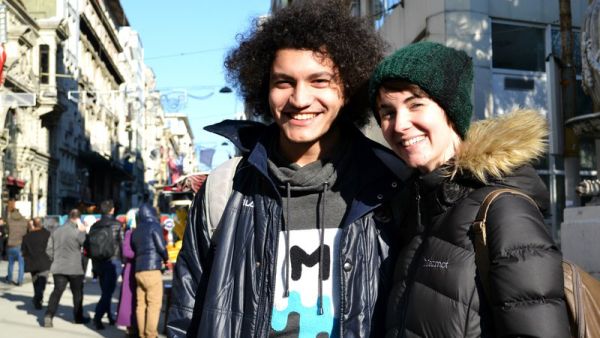US citizen Ella Wind met her fiance Feras in Syria before a civil war ripped the country apart.
At the start of the uprising, in 2011, she left while he stayed to finish his university studies. Now, US President Donald Trump's immigration ban is set to divide them again.
Feras lives in Canada, after his family won a visa lottery and was able to emigrate. Ella is studying for her doctoral degree in sociology in New York. The engaged couple have been aiming to move in together soon and in the meantime travel often to meet up.
"He has an American visa and he's come eight times already to New York. And we have been to Florida together to see my parents," the 26-year-old says.
The new immigration policy, which Trump put into effect over the weekend, means his visa is effectively useless.
Instead of Ella sponsoring Feras, 29, to come to the US, they will now have to wait for him to be fully naturalized as a Canadian citizen. Then, he can sponsor her to come to Quebec.
"This order means I can't live in the country I am from, and my partner can't come to the country I am from, or visit to see my parents," she explains.
The days since the order banning citizens of seven Muslim-majority countries have been frantic and stressful. Both have been on the phone with lawyers, government officials and advocacy groups, like the legal clinic at City University of New York.
"It's very hard to parse through all the information," says Ella.
The executive order was signed with the stated aim of stopping "radical Islamic terror." However, Feras is a Christian, and yet he is still blocked.
Trump pledged that Washington would increase support for Christians in the Middle East, but the migration ban seems to have superseded these plans.
Lebanese security forces told dpa this week that a Christian family was denied boarding to the United States and sent back to Syria.
"I have no idea how they propose to screen Christians from Muslims in any comprehensive or conclusive way," Ella notes.
"We are lucky," notes Ella. "We have the option of going to Canada. We have friends who have situations which are way worse."
One of those friends is Katheryn Balleh, a native of Idaho, who married her husband Bashar just two weeks before Trump's inauguration. The two met in Turkey, where she teaches English at a local university.
Bashar was born in Latakia, on Syria's coast. A guitarist and singer, he moved to Turkey in 2014 and since set up a band, Country for Syria, that mixes country music with Arabic fusion and Turkish inflections.
Just a week before Trump was elected, the band toured the United States on a 10-day whirlwind trip that took them from New York to Tennessee. As long as the executive order stands, he can never go back.
"I can hardly travel anywhere on my Syrian passport," he says with a knowing smile. She nods in agreement, as they eat falafel in a small Syrian-owned restaurant in Istanbul.
"We cannot go the same countries," Katheryn says. While Iran would let in Syrians, for example, US citizens are now banned in a tit-for-tat response to Trump's order which also applies to Iranians.
Bashar's family still lives in Latakia, but since Turkey hardly issues visas to Syrians any longer, they cannot come to visit.
"If I go back to Syria they will draft me right away into the army" to fight for the government in the civil war, explains Bashar.
"It's really depressing. Our families will probably never meet," Katheryn says. Her mother will not come to Turkey, amid heightened insecurity in the country, which has been battered by bombings and a failed military coup last year.
Bashar tried to smuggle himself to Europe in 2015, after struggling to get a job on decent pay in Turkey, where most Syrians lack work permits. One boss threatened to kill him when he complained about withheld wages.
The first attempt ended with the dinghy he took across the Aegean being shot and the passengers nearly dying at sea. The second time he was kidnapped and held for ransom. He then decided to stay in Turkey, eventually meeting Katheryn.
"I'm so proud of my band. And I just got married. In a way, things are really great," Bashar says, quickly adding: "But it was really hard."
They both now just want to be able to settle down together, legally, in a safe country without war, bombings and political persecution.








